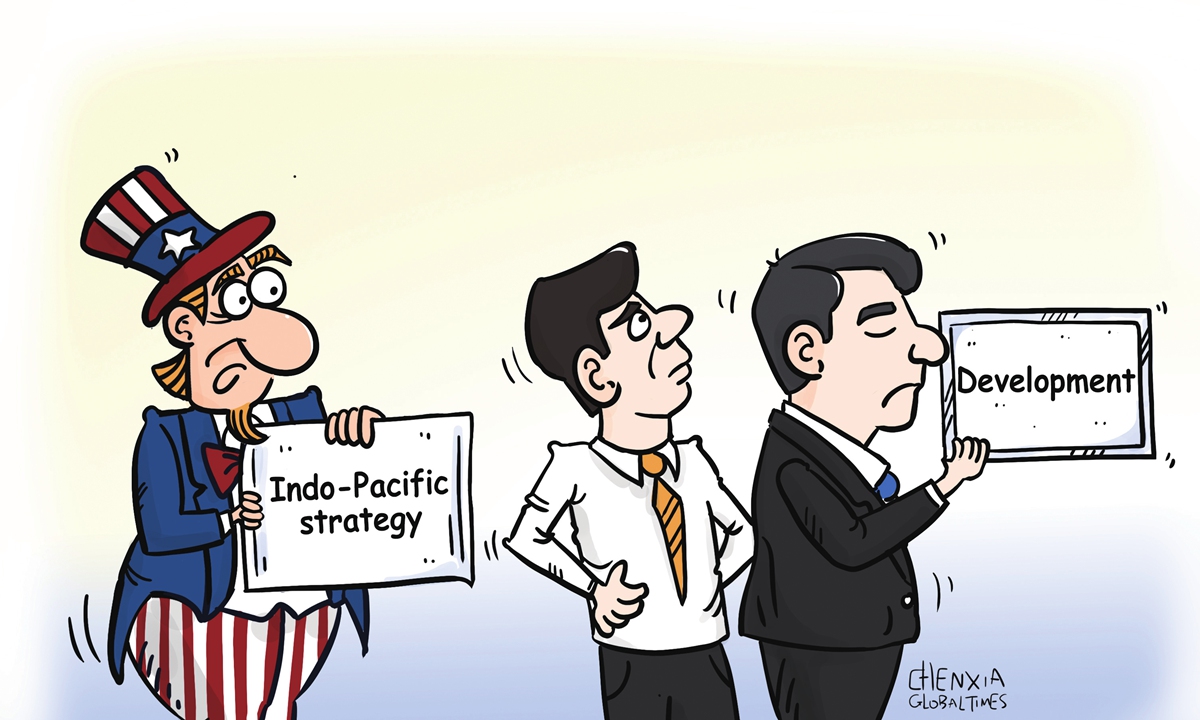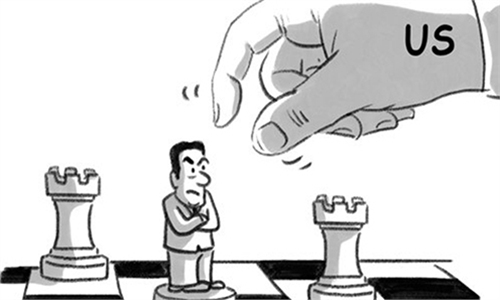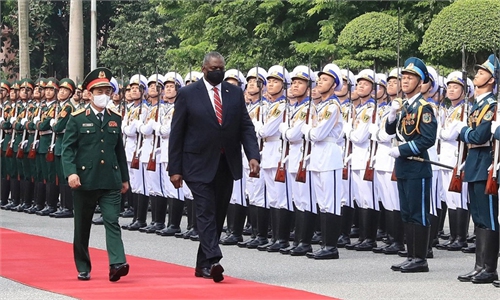
Illustration: Chen Xia/GT
The Biden administration is launching a new round of "diplomatic offensive" around its Indo-Pacific strategy. US Secretary of State Antony Blinken visited India on July 27. And on her trip to Northeast Asia, including Japan, South Korea and Mongolia, US Deputy Secretary Wendy Sherman chose Tianjin as the final stop to show China what she called the US "position of strength." At the same time, US Secretary of Defense Austin Lloyd arrived in Singapore on July 26 - the first trip by a cabinet-level official in the Biden administration to Southeast Asia.Moreover, US Vice President Kamala Harris will visit Singapore and Vietnam in August, according to the White House. This will mark the first time an American vice president will visit Vietnam.
Harris, whose mother is from India, is a female American politician of Asian descent who has played a prominent role in the Biden-Harris administration. She has been playing a special role in the Indo-Pacific strategy. She also attended the Quad Summit in March, a virtual meeting between the heads of state of those four countries.
The leaders of the Quad countries are preparing for the first in-person meeting of the group in Washington in late September, according to diplomatic sources. The Quad undoubtedly has become the core pillar of the Biden administration's Indo-Pacific strategy. The White House has also set up working groups on COVID-19 vaccines, critical and emerging-technologies, and climate change to advance the Quad mechanism.
The Biden administration is also working hard to forge a "Quad-plus" paradigm, pushing more allies and partners to join the structure. South Korea and Vietnam are all potential recruits for Washington.
The Moon Jae-in administration has avoided putting South Korea in the middle of a strategic contest between the US and China, but elections in March 2022 could bring a new, more pro-American president to Seoul. The Biden administration is also trying to get European countries such as Britain and France to become part of the "Quad plus."
The British Royal Navy's aircraft carrier HMS Queen Elizabeth assigned by the Johnson administration is operating in the South China Sea. This is not a symbolic military arrangement. Britain is substantially strengthening its security ties with Quad members.
Chinese strategists are even more alarmed by the Biden administration's push to extend NATO's power into the Indo-Pacific region. There is much debate about the possibility of Washington establishing an Asian version of NATO. Although US National Security Adviser Jack Sullivan denies it, reality and actions are more convincing.
In fact, the Biden administration's Indo-Pacific Strategy has triggered unease among regional countries. It has sought to make the Indo-Pacific region into a battleground for strategic competition with China. This has increased regional security tensions. Southeast Asia countries are worried that the Quad will erode ASEAN's "centrality."
The Biden administration's Indo-Pacific Strategy tends to put more emphasis on military. Yet the real challenge to regional countries lies in the economic downturn and non-traditional security fields. The COVID-19 pandemic makes these challenges more prominent and urgent. The Biden administration is bound by domestic populism and economic nationalism. In this respect, it can be argued that it cannot meet the economic needs of countries in the Indo-Pacific region.
The Biden administration's senior officials have recently kicked off frequent visits to Asia. Their tasks are inherently contradictory. For one, they hope to mobilize more regional countries to join the US' anti-China camp. For another, they want to reassure these regional countries, but they lack economic instruments and the panacea to restore regional countries' sufficient confidence toward the US. After all, the Biden administration has not figured out how to deal with Asia and China. The US' "position of strength" is far from what it has imagined.
The Biden administration has basically completed its China policy review. The Pentagon, in particular, has eagerly embarked on promoting an "integrated deterrence" against China. In the process of preparing the first in-person Quad summit scheduled for September, the US' China policy will become increasingly aggressive. Beijing will obviously not show its weakness. More tit-for-tat practices could lead to more fluctuations in China-US relations. Beijing and Washington are exploring new approaches to deal with each other. Yet properly managing the conflict is their shared responsibility in these critical days.
The author is a senior research fellow at the Charhar Institute and an adjunct fellow at the Chongyang Institute for Financial Studies at Renmin University of China. opinion@globaltimes.com.cn


